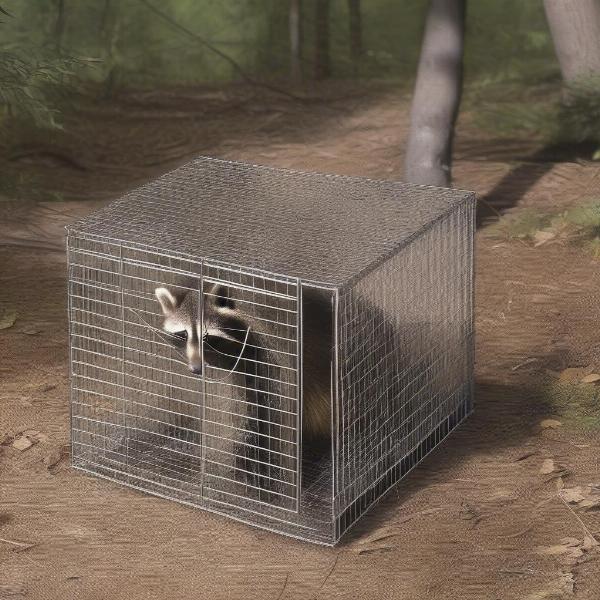Raccoon problems can be a nuisance, and traditional traps can pose a danger to curious dogs. Finding a truly dog-proof raccoon trap like the Duke Traps brand is essential for protecting your furry friend while effectively managing wildlife. This article explores the importance of dog-proof raccoon traps, specifically focusing on the Duke Traps brand, and offers valuable insights into safe and humane raccoon control.
Protecting your dog from harm is a top priority for any responsible pet owner. Standard raccoon traps can cause serious injury to a curious dog, making the search for a reliable dog-proof option crucial. Duke Traps are known for their dog-proof design, offering a solution that effectively targets raccoons while safeguarding your canine companion. We’ll delve into the features that make Duke Traps a safer alternative and discuss the benefits of choosing a humane approach to raccoon control.
Understanding the Importance of Dog-Proof Raccoon Traps
Why are dog-proof raccoon traps so important? Simply put, they prevent accidental injuries. A conventional trap can snap shut on a dog’s paw or nose, causing significant pain and potentially long-term damage. Dog-proof traps, like those offered by Duke Traps, utilize design features that minimize the risk to non-target animals, providing peace of mind for pet owners. These traps often employ enclosed trigger mechanisms or require specific actions to activate, making them less likely to harm a curious dog.
Choosing the right trap is vital for ensuring both effectiveness and safety. Not all traps marketed as “dog-proof” are created equal. Duke Traps are specifically designed with canine safety in mind, incorporating features that effectively exclude dogs while remaining highly effective against raccoons. The construction and design of these traps are crucial for achieving this balance.
Duke Traps: A Closer Look at Features and Benefits
What makes Duke Traps stand out? Their innovative design and robust construction make them a leading choice for dog-proof raccoon control. Features like enclosed trigger mechanisms and specific activation requirements minimize the risk to pets while maximizing the chances of capturing the targeted raccoon. These traps are built to withstand the elements and provide reliable performance over time.
 Duke Traps in Action
Duke Traps in Action
Humane trapping is a key consideration when dealing with wildlife. Duke Traps, while effective in capturing raccoons, are also designed with humane principles in mind. They aim to minimize stress and injury to the animal, ensuring a more ethical approach to pest control. The design allows for safe relocation of the captured raccoon, minimizing suffering.
Choosing and Setting Duke Traps for Optimal Results
Where should you place Duke Traps for maximum effectiveness? Strategic placement is essential for successful trapping. Identifying areas of high raccoon activity, such as near garbage cans, compost piles, or entry points to your home, can significantly increase your chances of a capture. Understanding raccoon behavior and their preferred routes is crucial for optimal trap placement.
“Using dog-proof traps like the Duke brand gives me peace of mind knowing my dogs are safe while I address the raccoon issue,” says Dr. Amelia Shepherd, a certified veterinarian specializing in canine safety and wildlife management. “It’s a responsible and effective solution for protecting both pets and property.”
Conclusion
Protecting your beloved canine companion while addressing raccoon problems is achievable with the right tools. Duke Traps offer a dog-proof solution that provides both safety and effectiveness. By understanding the importance of dog-proof traps, exploring the features of Duke Traps, and implementing humane trapping practices, you can effectively manage raccoon populations while safeguarding your furry friend. Choosing a humane and dog-proof trap like Duke Traps ensures the well-being of your pet and promotes responsible wildlife management.
FAQ
- Are Duke Traps truly dog-proof? Duke Traps are designed with features that significantly reduce the risk to dogs, but no trap is entirely foolproof. Supervision and strategic placement are still recommended.
- What bait works best with Duke Traps? Raccoons are attracted to a variety of baits, including sweet corn, marshmallows, and even pet food.
- Where can I purchase Duke Traps? Duke Traps are available at many hardware stores, outdoor retailers, and online marketplaces.
- How do I relocate a trapped raccoon? Check local regulations regarding wildlife relocation. Wear protective gloves and transport the raccoon in the trap to a suitable release location, away from residential areas.
- What should I do if my dog gets caught in a trap (even a dog-proof one)? Remain calm and carefully release the trap, ensuring your safety and the dog’s. Seek veterinary attention if necessary.
- Are there alternatives to trapping raccoons? Exclusion methods, such as sealing entry points to your home, can be effective in preventing raccoon intrusions.
- How do I prevent raccoons from returning to my property? Secure garbage cans, remove potential food sources, and trim back vegetation near your home.
We currently don’t have any related articles on our website.
About ILM Dog
ILM Dog (https://ilmdog.com) is your trusted source for comprehensive information on dog care and wellbeing. We cover everything from breed selection and puppy care to senior dog health, training, nutrition, and product recommendations. Our expert advice helps you provide the best possible care for your canine companion. For personalized guidance and support, contact us at [email protected] or +44 20-3965-8624.